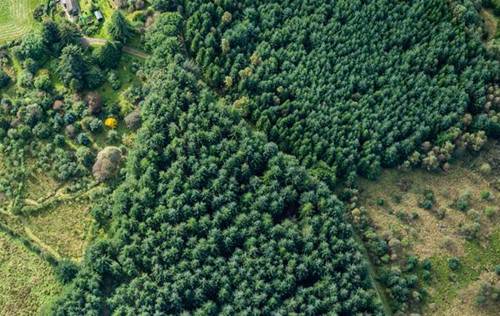Scottish businesses bring space data down to earth
05 Oct 2020 • 12 minute read
Daniel Smith, founder of AstroAgency, shines the spotlight on Scotland's space sector and its benefits to businesses.

Millions of Scots use space data every day to commute, communicate and keep an eye on the rapidly changing weather forecasts. But how many people know that Scotland is a world leader in small satellite manufacturing and space data analysis?
Daniel Smith, founder of AstroAgency and member of the Scottish Space Leadership Council, shines the spotlight on Scotland's space sector and its benefits to businesses.

The Musk, Bezos and Branson effect
"There’s no question that people are taking notice of spaceflight again. Space-obsessed billionaires like Elon Musk, Jeff Bezos and Sir Richard Branson have ensured that certain aspects of space activity and capability are, once again, captivating a mainstream audience.
"But as a society we have not yet linked futuristic happenings in the space industry —from the visible Starlink satellites streaking across our skies to the testing of air launch systems— to the everyday space tech that enables so much in our everyday lives.
"This is remarkable, given that the majority of those reading this article will have accessed satellite data multiple times already today.
"It might be the radio that you listen to during your morning coffee, the GPS guidance that gets you from point A to point B, the internet signal that lets you surf the web, or the latest weather report that helps you decide what you should wear when you head outside (although in Edinburgh I tend to take a raincoat either way).
The Scottish space sector
"The types of satellites that are built by Glasgow based companies such as Spire Global, AAC Clyde Space and Alba Orbital are designed for low-Earth orbit — only a few hundred kilometres up.
"Their close proximity to Earth and small size (conventional satellites tend be anything from the size of a washing machine up to any of the Lothian buses that roll up and down the Scottish capital city’s streets, but typical ‘CubeSats’ are smaller than a shoebox and sometimes not much larger than a can of Irn-Bru) make these satellites well-suited to using cameras to observe the Earth.
"In fact, whether it’s tracking the impact of climate change, monitoring shipping lanes or keeping a record of crop yields, CubeSats play a variety of roles in providing the satellite data used to inform other industries.
"The term 'data-driven economy' is often used in relation to the UK space sector, because accessing space data is not so much about the launches that make so many swoon with their fiery engines and incomprehensible power (known in the industry as "upstream activity"), but instead about the resulting data supply and analysis, usually referred to as the "downstream" aspect.
"Yes, some rockets lift off with astronauts, or exploratory rovers or supplies for the International Space Station (which you can also see flying past, by the way, on a rare clear night in most parts of the country), but the vast majority are taking satellite payloads to Low Earth Orbit to find solutions to everyday problems on Earth from a better vantage point above.
Launching small satellites from Scotland
"In Scotland, and a very limited number of UK regions such as Cornwall, geography has fortuitously ensured that our speciality will be the launch of small satellites on small launch vehicles from small launch pads to lucrative orbits that can access the whole of the Earth’s surface.
"To do that, instead of launching Eastwards like many large rockets do, smaller rockets are better suited heading North or South into Polar orbits. This makes Scotland an ideal location, because rockets can safely launch to the North.
"For the launch enthusiasts out there, there is no reason to be disappointed by this idea of "small launch". The rockets will still be impressive, despite all developing UK launchers being dwarfed by the 70m SpaceX Falcon 9 that recently launched US astronauts to the International Space Station.
"Ultimately, our small but perfectly formed Scottish space value chain will dictate that UK space tourism will be limited to people witnessing occasional satellite launches rather than actually travelling into the cosmos themselves. Although, Prestwick Spaceport might be an exception due to opportunities being explored as a consequence of the pursuit of a less-traditional 'air launch' approach. One where the launcher is carried aloft by an aircraft to a more advantageous position, before being released to make the rest of its journey up into space – essentially the launcher equivalent of being given a 'leg up'.

Harnessing space data
Earth observation
"The capital has seen a number of companies emerge, usually from University spinoffs, as global leaders in satellite data analysis. These analyses can be shared with a whole range of businesses to help inform their decisions and improve their services.
"One such company is Global Surface Intelligenceopens in a new window (GSI), who capture images of the Earth from satellites and use them for a wide range of planet benefiting purposes. For example, some projects employ satellite imagery to gain an accurate idea of the size of forests and the types of trees growing within them. Traditionally, such work would be incredibly laborious and even dangerous, taking time and great effort. Even then, some forests around the globe are almost impossible to navigate and technologies such as drones are less efficient than observing from space. GSI has so far measured over 100 million hectares of natural resources across areas like forest and soil carbon resource availability and sustainable food supply chains.
"Scottish businesses are already benefiting from space in a number of innovative ways and new ideas come along all the time. Glasgow-based Trade in Spaceopens in a new window analyses space data to predict crop yields and provide financial insights, boosting the financial sector.
"Meanwhile, Aberdeen-based firm Planetary AIopens in a new window is looking at how space data can unlock a truly golden opportunity. The company aims to acquire data from space tech firms and use it to help them discover valuable mineral deposits that are currently underneath the earth.
"To take another example, the aquaculture sector —which contributes £1.8 billion to the Scottish economy each year— is looking to use space data to predict harmful algae blooms. Even whisky, the quintessential Scottish product, has been flown into space as far back as 2011, with Ardbeg aging samples of whisky on the International Space Stationopens in a new window for three years as part of a maturation experiment. This was to see how flavour compounds in the spirit, known as 'terpenes', would react in microgravity compared to their more traditional warehouse storage.
"The type of data analysis work being done in Scotland is also occurring in other areas of the UK and beyond, with companies like 4 Earth Intelligence (4EI) in Bristol looking to space in order to identify where heat affects vulnerable populations, recently creating the UK’s first street level map of ‘at risk’ regions to help manage the effects of extreme weather conditions. This data is being made available free to national organisation that are currently battling the coronavirus pandemic.
"At the time of writing in the US, Maxar technologies is using earth observation to inform the clean-up process from the tragic oil spill in Mauritius.
"Just this month, the European Space Agency announced an initiative to use space imagery to support the insurance industry as it reimburses people affected by natural disasters.
Space spinoffs
How technology transfer is making our lives safer
"The benefits from the space sector are not limited to Earth observation — technology transfer and space-enabled services make lives safer here on the ground. For example, carbon composites from rocket nozzles and technology from solid rocket motors are used in high-performance braking systems and airbags, making our roads safer.
"Space tech has also been used to improve medical technology — technologies from x-ray astronomy can be used to detect skin cancer, insights from space robotics are being used to build cutting-edge exoskeletons for paraplegics, and systems used to monitor astronauts onboard the space station have helped in developing remote healthcare for the elderly here on Earth.
"The effects of space travel also allow researchers to learn more about the human body. Free from the constant force of gravity, space travel causes astronauts to rapidly lose bone density on orbit, a process which improves our understanding of diseases like osteoporosis — one of the world's most common bone diseases; affecting roughly 200 million people globally and nearly a quarter of a million people in Scotland alone.

"GPS underpins wide sections of the economy, ranging from precision agriculture to construction and logistics. As if that weren’t enough, communications networks, financial systems, and power grids rely on the precise time synchronisation offered by GPS.
"Next time you step into an Uber, it’s worth remembering that the space sector is working behind the scenes every day to enable life as we know it in Scotland and beyond.
Space for everyone
A high-tech catalyst for growth across all industries
"The space industry can’t grow without space regulation and the Scottish and wider UK government’s growing support of the space sector is welcomed. More and more it is becoming clear that space isn’t so much an industry on its own, but a high-tech catalyst for growth across all industries.
"Long may our local businesses be part of the supply chain for the emerging commercial New Space movement, and long may the rest of Scotland, and far beyond, benefit from it.
"It’s about knowing what the weather will be (still changing by the looks of things) and preventing us from getting lost. It serves almost every sector imaginable, all the while inspiring and encouraging our young scientists and engineers to reach for the stars.
"JFK put it far more eloquently than I ever could in his regularly quoted address 'We Choose To Go To The Moon':
Space exploration serves... 'to organise and measure the best of our energies and skills' insisting, 'our leadership in science and in industry…require us to make this effort.'
Unlimited potential
Scotland's culture of innovation and collaboration and supportive business environment
"The barrier to entry to the industry for companies outside the space sector is far lower than many people realise, offering opportunities for many companies who are not even aware of the market they could be in.
"As well as addressing their existing markets, many companies are effectively missing a rapidly growing new market two hundred kilometres above their heads, limited only by the size of their ambitions, and given the international nature of the space sector, there are export opportunities galore.
"Closer to home and over fifty years later, our very own "Space Minister", Ivan McKee highlighted Scotland’s "culture of open innovation and collaboration" at a parliamentary reception last year at Holyrood, while the remains of the UK’s only orbital launch vehicle to date, Black Arrow, was proudly displayed outside.
"He also lauded our "supportive business environment, with the developing National Manufacturing Institute for Scotland, real academic strengths, a range of practical support and advice available via our enterprise agencies, and a strong partnership with the sector through the industry-led Scottish Space Leadership council."
"With the UK and Scottish governments working together on the international stage to support the burgeoning commercial space sector, there’s no doubt that even with the challenges that are to come following the global pandemic and a shifting political landscape, almost any sector you can think of will continue to benefit from space. Even if we don’t always realise it.
Why invest in space?
"I’ll finish by addressing a question I’m often asked - why spend money on space when there are so many issues on earth that we have yet to resolve?
"This sentiment feels more pertinent during 2020 than in any other year in my lifetime. However, the reality is that money spent on space is, of course, actually spent here on Earth. After all, there are no large factories in space, no schools or shops, no offices in space. Moreover, the move from public to private investment in this sprawling sector enables us all to benefit from space technology and information in so many ways.
"This investment can help us in our battle for a better, cleaner Earth. One where we can use low-cost access to space in order to improve our local economy while enhancing the lives of people around the planet, be it through education, navigation, healthcare, entertainment or most critically, environmental protection.
"Businesses, whether in the industry or interested in growing through the opportunities offered through the space sector, stand at a threshold, where there is a real chance to use their transferable skills and experience to move into a rapidly expanding market, regardless of whether they are an engineering firm, safety consultancy, legal practice, logistics company or anything else.
"The opportunity is there to extend your business not so much into the final frontier, but into a new commercial frontier. And who knows, perhaps the next space-enabled billionaire will be reading this right now…"
Daniel Smith is the founder of AstroAgency, an Edinburgh-based strategic marketing firm providing support exclusively for global space sector organisations and new entrants to the market. He is a Board member of mission management firm Responsive Access, a former Director of Skyrora and an active member of the Scottish Space Leadership Councilopens in a new window. He also sits on the Cross-Party Group for Space at the Scottish Parliament and the UKSpace Launch Industry Group.
You might also be interested in
-
Scotland's secret space race
PODCAST SERIES 2: Interviews with politicians, astronauts, space scientists and satellite experts to unveil the incredible innovation going on in Scotland.
-
Space tech innovation in Scotland
More than 130 companies are shaping Scotland’s global reputation as a world-leader in space technology. Here's a sample of those startups to watch.
-
How space data can protect the planet
Think of a world where sustainable farming becomes the norm. Discover how space tech developed by Ecometrica in Edinburgh is helping end deforestation in West Africa.
Find space tech solutions
From Earth observation to data analysis, satellite manufacture to launch, we can put you in touch with the right people.
